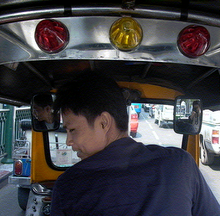
This is a long due post, and follow up to this Bangkok-Jakarta comparative study, which result was recently disseminated in a national workshop. Background to the study was written by Sri Palupi from Institute for Ecosoc Rights here and by a Kompas reporter here. The workshop presented survey findings conducted by Institute for Ecosoc Rights and set up a national network for stakeholders of major cities in Indonesia.
Another researcher for the study, Suryono Herlambang, a lecturer in planning at Universitas Tarumanagara, put forward major contribution of street vendors in Jakarta. The study urged public participation in planning and management of cities and incorporation of the poor as part of cities in Indonesia, with a particular stress for Jakarta.
In the last link, I just would like to set the record straight that the real credits for the survey findings and numbers on the street vendors should go to Institute for Ecosoc Rights and Suryono Herlambang respectively. As my previous experiences with reporters, words have not been credited properly and some have even been put into my mouth.
The workshop also featured a presentation by Somsook Boonnyabancha, director of CODI (Community Organization Development Institute), a special government unit of Thailand that deals specifically with the problem of poor communities through Baan Mankong Program. In her speech, she spoke about the problem with the inability of systems - be it governmental or institutional organizations (including academic and non-governmental) - to keep up with rapid changes that happen in today's society. She insisted that people in (poor) communities are the key in finding the solutions to their own problems.
While we realize, and many would say, that of our findings from Bangkok can't be directly applicable to Jakarta, I would argue that the problems should nevertheless be addressed. I do think, though, that Indonesia is in desperate need of success stories from within the country so skeptics, pessimists, and critics alike could start thinking that it is possible to have a better Indonesia.
The following notes are in addition to the above links:
1. In Jakarta, informal economy activities give major contribution to the economy of the city, but unfortunately they are not being properly supported by allocation of space and opportunities.
2. Although Bangkok's modern shopping centers are more in numbers than that of Jakarta's, they co-exist with traditional markets and street vendors. Bangkok value the informal communities' contribution in economy, history, culture, and society.
Other detail findings will follow (soon, hopefully).




No comments:
Post a Comment